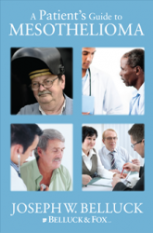
FDA Grants Breakthrough Therapy Designation to Drug Targeting Biomarker Found in Lung Cancer and Mesothelioma Patients
 Boehringer Ingelheim announced last month that the U.S. Food and Drug Administration has granted Breakthrough Therapy Designation to its investigational cancer drug BI 1482694 for the treatment of non-small cell lung cancer (NSCLC).
Boehringer Ingelheim announced last month that the U.S. Food and Drug Administration has granted Breakthrough Therapy Designation to its investigational cancer drug BI 1482694 for the treatment of non-small cell lung cancer (NSCLC).
According to Boehringer Ingelheim, the maker of 1482694, the drug is targeted to NSCLC patients whose tumors have epidermal growth factor (EGFR) mutations, including the resistance mutation, T790M. This specific mutation is common in tumors progressing after undergoing treatment with other EGFR tyrosine kinase inhibitor (TKI) drugs.
“We feel this designation reflects the potential of the compound to be an important part of the treatment of non-small cell lung cancer in patients with T790M mutation,” said Tarek Sahmoud, MD, PhD, vice president of Oncology Clinical Development and Medical Affairs, in a Dec. 21 press release.
The T790M mutation is the most common resistance mechanism that develops from EGFR TKI therapy. This resistance occurs in approximately 50% of NSCLC patients who have received previous EGFR TKI therapy, reports Boehringer Ingelheim.
EGFR, a protein found on the surface of some cells to which epidermal growth factor binds and causes the cells to divide and spread, is found at abnormally high levels on the surface of many types of cancer cells. Researchers report over 50% of pleural mesothelioma patients express the EGFR protein. EGFR is often targeted by researchers hoping to find new, effective treatments for lung cancer and mesothelioma.
Pleural mesothelioma is a rare, serious cancer affecting the lining of the lungs that occurs in individuals exposed to airborne asbestos fibers. Pleural mesothelioma and lung cancer patients often undergo similar treatments making a potential new, effective therapy critical to all respiratory cancer patients.
The FDA granted designation based on the positive results from the Phase I/II clinical trial of the drug. Boehringer Ingelheim reports objective responses were observed in 62 percent of the patients, including 46 percent whose tumor response had been confirmed by the time of data cut-off. In addition, disease control rate was 91 percent.
If a drug is designated as breakthrough therapy, according to the FDA, the agency will expedite the development and review of such drug. All requests for breakthrough therapy designation will be reviewed within 60 days of receipt, and FDA will either grant or deny the request.
“Our aim at Boehringer Ingelheim is to prolong the continuum of treatment with targeted therapies for patients with EGFR mutation-positive lung cancer with a treatment that could potentially be efficacious even after the inevitable occurrence of resistance to the initial treatment,” said Dr Mehdi Shahidi, Medical Head, Solid Tumour Oncology, Boehringer Ingelheim.
In November, the FDA granted accelerated approval to another drug targeting the EGFR T790M mutation. Tagrisso, also known as AZD9291, was the first drug approved for NSCLC patients with the EGFR T790M mutation.
Approximately 3,000 Americans are diagnosed each year with the incurable mesothelioma. An estimated 221,200 new diagnoses and 158,040 deaths in 2015 were due to lung cancer, according to the National Cancer Institute.

 Mike is a licensed attorney and the former editor of North Carolina Lawyers Weekly and South Carolina Lawyers Weekly. He has contributed numerous articles to the North Carolina State Bar Journal and is a co-author of Capital Lawyers, a history of the Wake County (NC) Bar.
Mike is a licensed attorney and the former editor of North Carolina Lawyers Weekly and South Carolina Lawyers Weekly. He has contributed numerous articles to the North Carolina State Bar Journal and is a co-author of Capital Lawyers, a history of the Wake County (NC) Bar.
 Gregory Froom is a licensed North Carolina attorney and the former editor of North Carolina Lawyers Weekly and South Carolina Lawyers Weekly.
Gregory Froom is a licensed North Carolina attorney and the former editor of North Carolina Lawyers Weekly and South Carolina Lawyers Weekly.
Leave a Reply